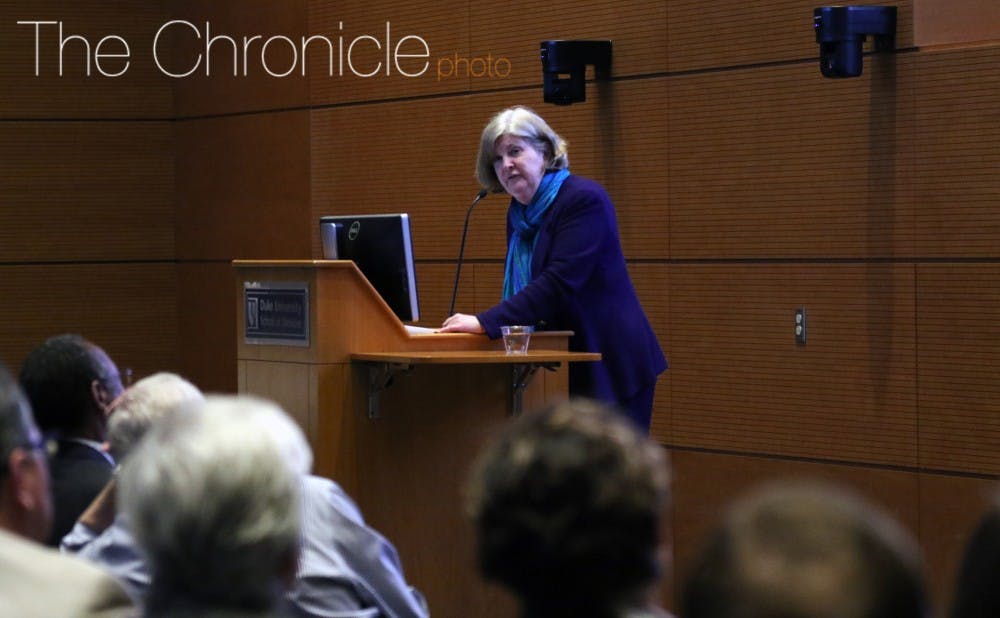Nancy Andrews, the outgoing dean of the School of Medicine, reflected on her vision and the school's progress during her final State of the School address Monday evening.
Andrews—who also serves as vice chancellor for academic affairs and Nanaline H. Duke professor of pediatrics—joined Duke in 2007 as the first female dean of the School of Medicine. Last year, Andrews and other administrators unveiled the school's 2016 Strategic Plan, its first formal update since 2006. Four guiding principles went into the plan, Andrews explained.
“[We want the School of Medicine] to become a destination of choice for world-class people, to develop a portfolio of world-class research, to have a campus that inspires and to expand and use [its] resources wisely.”
During the event, Andrews described some of the school’s major advances in achieving these goals. Regarding her aim of recruiting top faculty, Andrews complimented recent hires in the past year. These hires are Duke's “sunmakers," she said, for their role in promoting the School’s reputation.
“The reason we use the term ‘sunmaker’ is because you usually associate 'rainmaker' with a lot of money,” she said. “And while lots of money and grants can be good, that's not exactly what we meant here. We want to recruit faculty leaders who have outstanding work that shines, who collaborate in new ways and who attract new great recruits."
Even during the financial crisis of 2008, she said the school maintained their recruiting goals. This has contributed to the School of Medicine's prestigious standing today, she noted.
"During the economic downturn, we continued to recruit basic scientists, when some of our peer schools decided that was a luxury that they couldn't afford," she said. "I hope you'll agree now that that paid off for us, and certainly from what I've heard from colleagues outside of Duke, that's enhanced our reputation."
Andrews pointed to newly announced chairs Dr. Moira Rynn—the incoming head the department of psychiatry and behavioral sciences—and Dr. Matthew Barber, who will soon lead the department of obstetrics and gynecology. She also noted that the School of Medicine has become more interdisciplinary, for example by working with MEDx, which attempts to bridge the medical and engineering communities.
Discussing diversity, Andrews provided statistics for the racial and gender makeup of the School of Medicine and noted progress in both areas. As part of these efforts, she explained that the School has created the new position of assistant dean for underrepresented faculty development—held by Dr. Kevin Thomas.
She also applauded work by black physicians at the School of Medicine. Thomas and orthopedic resident Kwadwo Adu Owusu-Akyaw have recently used the "Black Men in White Coats" video campaign to encourage underrepresented communities to join the medical profession.
Moving to academics, Andrews said that the newly-established Center for Population Health Sciences has quickly transformed itself into a core division. She said the Center should be designated as a full department around July. This would be the School of Medicine’s first department in the social sciences, she noted, and would align closely with the larger goal of broadening the school’s research interests.
"I believe we should have a research spectrum that does span the entire biomedical spectrum, from basic sciences to population health, with good representation at every level in between," Andrews said.
She also described growth in the school's funding mechanisms, emphasizing their role in sustaining research and clinical activities. Between fiscal year 2015 and 2016, she said, there was a $50 million increase in grants from the National Institutes of Health.
In her concluding remarks, Andrews reflected on the importance of diversity to the School's overarching mission, and encouraged continued efforts after she leaves. Dr. Mary Klotman, chair of the department of medicine, will succeed Andrews in July.
“Diversity, inclusion and equity are fundamental to our excellence and to our success. We've made strides in diversifying our education programs, our staff and our faculty, but we still have a long way to go,” she said. “That said, the commitment of the school's senior leadership gives me confidence that we'll be led in the right direction and reap the benefits of a community where many perspectives and backgrounds are not only represented but are truly valued.”
Get The Chronicle straight to your inbox
Signup for our weekly newsletter. Cancel at any time.

